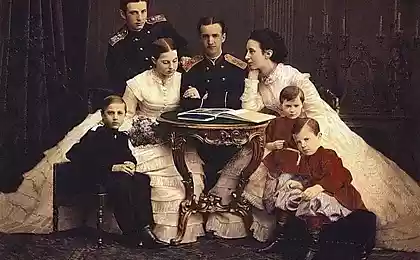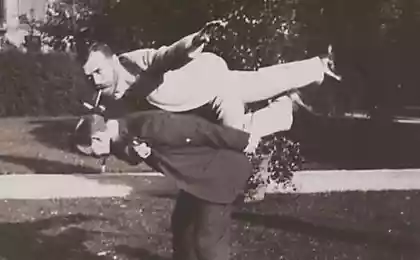540
Larisa Reisner and Nikolai Gumilev: Leri and Hafiz
Thirty five million three thousand three hundred sixteen
She had the appearance of an Olympic goddess. Or the Valkyries of old Germanic sagas. And her sharp ironic mind combined with the courage and fearlessness of a warrior. She loved the risk and reveled in the danger. She was furious with furious energy and desire to work for the benefit of mankind. She plunged into revolution, and was the only woman who fought in the Navy. Even during her lifetime she was surrounded by a halo of legends and all sorts of rumors.
Said that historical shot of the "Aurora" was done at her command; that the revolutionary hungry while she took a bath in champagne... Vsevolod Vishnevsky his play "Optimistic tragedy" was written about her. On beauty, poet, journalist, red Commissioner. On the brilliant Larissa Reisner.
The great poet Anna Akhmatova said about Larissa: "She stole my Gumilev". Reisner became the Muse and lover of poet, he dedicated many poems. And it, probably, not only in the divine beauty of Larissa, although it really was breathtaking. Huge brilliant gray-green eyes, regular features of the chiseled face, amazingly well proportioned handsome figure, luxurious chestnut tresses with a crown around his head.
"When she passed through the streets, it seemed that she carries her beauty like a torch... there was not one man who would have passed by without noticing her, and every third statistics, just set me, — broke ground in the post and watched. However, on the street no one dared to approach her: pride, squatina her every movement, every turn of the head, protected her stone, unbreakable wall," recalled the son of the writer Leonid Andreev Vadim.
Forty five million seven hundred thirty one thousand eight hundred fourteen
Pride is a family trait of Razmerov. The father of Larisa, Michael A., Professor of law, leading descended from the barons of the Rhine and taught at the universities of Lublin (where 13 may 1895, Larissa was born), Paris, Tomsk and St. Petersburg, and mother Ekaterina, née hitrova, hereditary noblewoman, the former a relative of the then Minister of war Sukhomlinov, and the younger brother of Larissa Igor, who became a famous orientalist, Professor, were a proud people. According to the same Vadim Andreev, "pride was Reynera, as the Musketeers of Alexander Dumas 'cloak and sword".
And, perhaps, pride and mother Larissa with the poet Nikolai Gumilev. Pride and fearlessness. Irresistible thirst for risk and danger. A burning desire to Excel in everything. "Reisner, not visualtest!"constantly criticized her teacher in high school, if it is too vigorously pulled his hand, trying to overtake their comrades. As with Gumilev in his childhood had a nervous breakdown when another boy was ahead of him in the race.
Twenty one million six hundred eighty eight thousand eight hundred ninety six
Met Larissa Reisner, then a student Psychoneurological Institute, and Nikolai Gumilev in 1915 in a fantastically painted the basement — the famous cabaret "stray dog", where every night after the theater and guests flocked to the Petrograd Bohemia. She enthusiastically read their poems from the stage, and he went suddenly standing attentively listened to a young poetess in a refined, decadent dress, with blue lipstick on.
But not so much her poems (they are Zinaida Gippius left a scathing review: "With claims; weak"), but she appeared as a unique phenomenon of art. As A Beautiful Lady. As a Woman of Destiny — the image is so inspiring imagination in those days
And fine poetic soul Gumilev could not fail to feel. He volunteered to Larissa. They took a cab, got off the tram and walked on the Petrograd side, to the street Big Zelenin, where she lived Larissa. Told mostly by himself — of the beauty of poetry, and it was more fun any lectures at the University, which Larissa visited volnoslushatelnitsey. Saying goodbye, Gumilev brought his Tatar eyes shone in the dark eyes. She really wanted to, he kissed her. But no kiss followed.
Seventy six million nine hundred eighty one thousand six hundred thirty four
After this meeting, Gumilev disappeared for a year — no letter, no call. The agony of waiting was tormented by Larissa. She gave myself not to think of Himself, to forget that moonlit night, but how could you forget... She's been having such disturbing dreams that when she woke up, her face on fire.
No-hassle publishing (along with the father of Larisa published the magazine "Rudin", designed "to stigmatize the scourge of satire and lampoon all the ugliness of Russian life, wherever it was," and were published under the pseudonym Rikki-Tikki-Tavi, is clearly inspired by Gumilev), my studies of literature could not distract her from the thoughts of the poet. And then Gumilev returned to Petrograd from the front, where he went as a volunteer, for passing the officers ' examinations, and the novel erupted with unprecedented force.
They met at the grille of the Summer garden, walked through the city, went to the Islands, riding on a sleigh ridden. Gumilev taught Larissa shoot he was a crack shot, hunting wild animals in Africa, left for a few months, and the return of the "exotic office" in his the Tsar's house was decorated with new skins, pictures, things.
If Gumilev knew how useful her skill during the military campaign of the revolutionary Volga flotilla in 1918, and not as feminine and give her a graceful hand with long fingers will be gripping the weapon — hand, whom he loved tenderly kissing…
Writer Lev Nikulin, met with Larissa in the revolutionary days in Moscow in hotel "Red fleet", recalled that in the lobby he saw a machine gun "Maxim" on the stairs — armed sailors, in the room of Larissa field telephone, Telegraph "the direct line" on the table — meal of stale bread and Browning.
Roommate was a famous sailor Zheleznyakov. The same man who said, "the Guard is tired!"and dispersed the Constituent Assembly. According to Nikulina, Larissa minted him in conversation:
— We shoot and we shoot the counter-revolutionaries! Cheers! British submarines attack our destroyers, on the Volga war began…
Nine million nine hundred seventy thousand two hundred sixty nine
When Gumilyov returned to regiment — heroic and sincere patriot, he believed that if the homeland is in danger, the duty of every honorable man to protect her — between the lovers struck up a correspondence with passionate declarations of love.
"I have a whole days lying in the snow, staring at the stars and mentally swiping in between the lines, drawing Your face looking at me from heaven," wrote the poet Larissa. And in another letter, he compared her with the famous characters of the mythology and literature: "I do not believe in reincarnation, but it seems to me that in his previous experiences You have always been kidnapped Helen of Sparta, Angelica from "Roland," etc. So I want You to take away. I wrote You a crazy letter, it's because I love You". Larissa trembled, and did not sleep nights, rereading addressed to her the poems and letters of ENU.
She called him Haysom, the name of the Persian poet of the FOURTEENTH century and he was fond of Oriental poetry and drew inspiration from it. And he did — Lery, the name of the heroine of his play "Handle" composed of Larissa, and which the poet gave to the soul at the same time and the wolf, and Swan. Maybe all it really was, and in this paradoxical combination of charm the mystery of Larisa Reisner? After all, the poets — with their intuition and prophetic gift — rarely wrong. If not mistaken…
Larisa said, "I loved him so much that he would go anywhere." And walked, stepping over his pride, cheap "numbering" on Gorokhovaya street, where there were Dating. But to marry him, when he called, for some reason did not go, though at first I wanted to. Whether because of reverence for Anna Akhmatova, formally continuing to be a wife Gumilev, and of female solidarity. Whether not being able to forgive a poet, that at the same time he first met Margaret Tumpowsky, and then with Anna Engelgart, where he married in 1918.
Absolutely ugly — with an elongated skull, squinting eyes, and a lisping speech, which seemed at first glance a cold and arrogant — Nikolai Gumilev nevertheless enjoyed enormous success with women. As soon as he began to read his poems, neither one of the girls couldn't resist.
Gumilev captured his genius, a romantic impulse, a heightened sense of self-esteem, desperate hussars. He served as beauty, as the knight without fear and without reproach. All madly liked Larissa.
And yet they parted ways. He warned her: "have Fun but not engage in politics." But it was politics and she did, finding in the revolutionary element vent to his boiling passion. To rule, to command, to risk his life — all stirred her blood.
The father of Larissa talked with August Bebel and Karl Liebknecht, corresponded with Lenin. In their family were filled with the spirit of social democracy. Larissa was among those who in 1917 had released prisoners in the fortress, who met Lenin and was thrilled to hear his speech, and it is quite natural that she joined the ranks of the Bolshevik party.
And Gumilev remained a staunch monarchist. To change their views even for the sake of your loved one none of them were going. Their love from the very beginning was born as a martial art, uncompromising duel between two strong and free individuals. No wonder Gumilev called Larisa from the verse "gentle friend, ruthless enemy." Needless to say that in this case, the sense was doomed…
In one of his last letters to Gumilev Reisner wrote: "... In the event of my death, all the letters will come back to You, and with them the strange feeling that binds us together and is like love..." And wishes to the poet: "Meet the miracles, create them yourself. My dear, my beloved... Your Leri". But Gumilev died before Larissa, and letters to him never came back…
Now Larissa — Commissioner, wife of the commander of the Volga flotilla Fedor Raskolnikov. With the fleet she went all her way of fighting, which began in Kazan in 1918, — the Volga, Kama and Belaya. At first the men took it warily — an incredibly beautiful that she seemed unearthly creature, a being from another world, besides the presence of women on the ship have always been considered a bad omen.
But after this baptism of fire, when, being on the boat under heavy fire, she not only asked me to turn, but was urged to go ahead, otherwise than with admiration and reverence to treat it but could not. Moreover, all the men without exception fell in love with her.
Courage Larissa was amazing. It is called, and the bullet was afraid, and did not take a bayonet. She did not cringe in fear under fire, as Gumilev, awarded for bravery two "George", went to investigate, made daring forays, was taken prisoner, was on the verge of death, and every time was a winner. And remained with the woman, showing off in front of the sailors in the clothes found in abandoned estates.
Guests who came to Larissa Reisner in the apartment of the former Minister of marine Grigorovich, which she occupied together with Raskolnikov, by the time the commander of the Baltic fleet, were amazed by the abundance of objects and utensils, carpets, paintings, exotic fabrics, bronze Buddhas, majolica dishes, English books, bottles of French perfume…
And the hostess herself was dressed in a luxurious Bathrobe, stitched with heavy gold thread. "We are building a new state. We need people. Our activities are creative, but because it would be hypocritical to deny myself that always gets to people in power," — had no qualms, she said.
Larissa enjoyed all the benefits, which provided her power — hosted Grand receptions, rode with the poet Alexander Blok on horses, specially delivered to her from the front, traveled around the city by car, smartly dressed, in a very reaching her naval overcoat to the nines, smelling of perfume. But remember, most recently on the front she was suffering from cold and hunger, lice and bouts of fever, and every day risked his life.
The news of the death of Gumilev — he was shot in August 1921 on charges of participating in a counterrevolutionary conspiracy is caught Larisa in Afghanistan, where Ambassador extraordinary and Plenipotentiary of the young Soviet Republic was sent Fedor Raskolnikov. It left a strange confidence — if she were then in Petrograd, she would have managed by some miracle to save Nicholas, the love of which continued to live in her heart.
Ninety six million seven thousand two hundred eighty
She says: "the Death of Gumilev — the only spot on the Reese revolution." And in a letter to his mother wrote: "If before his death saw him, he just would have said that no one loved with such pain, with such a desire for him to die like him, the poet Hafiz, a monster and a scoundrel".
Measured and calm life in the East, where time flows slowly and no hurry, quickly tired of Larissa. She fled to Russia, in order to "tear of Sands" Raskolnikov, but gradually the tone of her letters to him became colder and colder, and finally it asked him for a divorce. It became clear that she had someone else.
They were Karl Radek, journalist and speaker, a man of rare intelligence and talent, but not handsome: with a bald head, glasses, a head shorter than Larissa. Besides, he incessantly smoked like a chimney.
Again the story of beauty and the beast, and again for Larissa attractiveness of her friend didn't mean anything. In his youth, having passion handsome writer Leonid Andreyev and disappointed in him because of his addiction to alcohol, she swore not to love handsome men.
Under the influence of Radek has honed her journalistic style. She gave out shiny publications one after the other. With Radek Reisner went into the throes of revolution, Germany. From there, she brought a book of essays, "Hamburg at the barricades", from the Urals and the Donbas — "Iron, coal and real people." Using the time of treatment in Wiesbaden, wrote a book about the position of the German working class "Hindenburg".
It involves journalistic fervor, in a head there were thoughts to create a series of essays about the Decembrists... But it was worth it to be alone, her soul came to life inspired lines most beloved of her man…
She wanted to die under the bullets on the battlefields but died on a hospital bed, a SIP of raw milk infected with typhoid fever. She was only thirty years old. In the death of Larissa at first many did not believe — it was so unexpected and ridiculous.
"Why did you die Larissa, gorgeous, rare, selected human instance?"asked the famous journalist Mikhail Koltsov. Perhaps that is because she was too bright for life on earth. Such stars of the first magnitude — the earth is not a long time, unable to endure the dazzling brilliance of their published...
Author: Elena Erofeeva-Litvinsky
P. S. And remember, just changing your mind — together we change the world! ©
Source: www.matrony.ru/larisa-reysner-i-nikolay-gumilev-leri-i-gafiz/
She had the appearance of an Olympic goddess. Or the Valkyries of old Germanic sagas. And her sharp ironic mind combined with the courage and fearlessness of a warrior. She loved the risk and reveled in the danger. She was furious with furious energy and desire to work for the benefit of mankind. She plunged into revolution, and was the only woman who fought in the Navy. Even during her lifetime she was surrounded by a halo of legends and all sorts of rumors.
Said that historical shot of the "Aurora" was done at her command; that the revolutionary hungry while she took a bath in champagne... Vsevolod Vishnevsky his play "Optimistic tragedy" was written about her. On beauty, poet, journalist, red Commissioner. On the brilliant Larissa Reisner.
The great poet Anna Akhmatova said about Larissa: "She stole my Gumilev". Reisner became the Muse and lover of poet, he dedicated many poems. And it, probably, not only in the divine beauty of Larissa, although it really was breathtaking. Huge brilliant gray-green eyes, regular features of the chiseled face, amazingly well proportioned handsome figure, luxurious chestnut tresses with a crown around his head.
"When she passed through the streets, it seemed that she carries her beauty like a torch... there was not one man who would have passed by without noticing her, and every third statistics, just set me, — broke ground in the post and watched. However, on the street no one dared to approach her: pride, squatina her every movement, every turn of the head, protected her stone, unbreakable wall," recalled the son of the writer Leonid Andreev Vadim.
Forty five million seven hundred thirty one thousand eight hundred fourteen
Pride is a family trait of Razmerov. The father of Larisa, Michael A., Professor of law, leading descended from the barons of the Rhine and taught at the universities of Lublin (where 13 may 1895, Larissa was born), Paris, Tomsk and St. Petersburg, and mother Ekaterina, née hitrova, hereditary noblewoman, the former a relative of the then Minister of war Sukhomlinov, and the younger brother of Larissa Igor, who became a famous orientalist, Professor, were a proud people. According to the same Vadim Andreev, "pride was Reynera, as the Musketeers of Alexander Dumas 'cloak and sword".
And, perhaps, pride and mother Larissa with the poet Nikolai Gumilev. Pride and fearlessness. Irresistible thirst for risk and danger. A burning desire to Excel in everything. "Reisner, not visualtest!"constantly criticized her teacher in high school, if it is too vigorously pulled his hand, trying to overtake their comrades. As with Gumilev in his childhood had a nervous breakdown when another boy was ahead of him in the race.
Twenty one million six hundred eighty eight thousand eight hundred ninety six
Met Larissa Reisner, then a student Psychoneurological Institute, and Nikolai Gumilev in 1915 in a fantastically painted the basement — the famous cabaret "stray dog", where every night after the theater and guests flocked to the Petrograd Bohemia. She enthusiastically read their poems from the stage, and he went suddenly standing attentively listened to a young poetess in a refined, decadent dress, with blue lipstick on.
But not so much her poems (they are Zinaida Gippius left a scathing review: "With claims; weak"), but she appeared as a unique phenomenon of art. As A Beautiful Lady. As a Woman of Destiny — the image is so inspiring imagination in those days
And fine poetic soul Gumilev could not fail to feel. He volunteered to Larissa. They took a cab, got off the tram and walked on the Petrograd side, to the street Big Zelenin, where she lived Larissa. Told mostly by himself — of the beauty of poetry, and it was more fun any lectures at the University, which Larissa visited volnoslushatelnitsey. Saying goodbye, Gumilev brought his Tatar eyes shone in the dark eyes. She really wanted to, he kissed her. But no kiss followed.
Seventy six million nine hundred eighty one thousand six hundred thirty four
After this meeting, Gumilev disappeared for a year — no letter, no call. The agony of waiting was tormented by Larissa. She gave myself not to think of Himself, to forget that moonlit night, but how could you forget... She's been having such disturbing dreams that when she woke up, her face on fire.
No-hassle publishing (along with the father of Larisa published the magazine "Rudin", designed "to stigmatize the scourge of satire and lampoon all the ugliness of Russian life, wherever it was," and were published under the pseudonym Rikki-Tikki-Tavi, is clearly inspired by Gumilev), my studies of literature could not distract her from the thoughts of the poet. And then Gumilev returned to Petrograd from the front, where he went as a volunteer, for passing the officers ' examinations, and the novel erupted with unprecedented force.
They met at the grille of the Summer garden, walked through the city, went to the Islands, riding on a sleigh ridden. Gumilev taught Larissa shoot he was a crack shot, hunting wild animals in Africa, left for a few months, and the return of the "exotic office" in his the Tsar's house was decorated with new skins, pictures, things.
If Gumilev knew how useful her skill during the military campaign of the revolutionary Volga flotilla in 1918, and not as feminine and give her a graceful hand with long fingers will be gripping the weapon — hand, whom he loved tenderly kissing…
Writer Lev Nikulin, met with Larissa in the revolutionary days in Moscow in hotel "Red fleet", recalled that in the lobby he saw a machine gun "Maxim" on the stairs — armed sailors, in the room of Larissa field telephone, Telegraph "the direct line" on the table — meal of stale bread and Browning.
Roommate was a famous sailor Zheleznyakov. The same man who said, "the Guard is tired!"and dispersed the Constituent Assembly. According to Nikulina, Larissa minted him in conversation:
— We shoot and we shoot the counter-revolutionaries! Cheers! British submarines attack our destroyers, on the Volga war began…
Nine million nine hundred seventy thousand two hundred sixty nine
When Gumilyov returned to regiment — heroic and sincere patriot, he believed that if the homeland is in danger, the duty of every honorable man to protect her — between the lovers struck up a correspondence with passionate declarations of love.
"I have a whole days lying in the snow, staring at the stars and mentally swiping in between the lines, drawing Your face looking at me from heaven," wrote the poet Larissa. And in another letter, he compared her with the famous characters of the mythology and literature: "I do not believe in reincarnation, but it seems to me that in his previous experiences You have always been kidnapped Helen of Sparta, Angelica from "Roland," etc. So I want You to take away. I wrote You a crazy letter, it's because I love You". Larissa trembled, and did not sleep nights, rereading addressed to her the poems and letters of ENU.
She called him Haysom, the name of the Persian poet of the FOURTEENTH century and he was fond of Oriental poetry and drew inspiration from it. And he did — Lery, the name of the heroine of his play "Handle" composed of Larissa, and which the poet gave to the soul at the same time and the wolf, and Swan. Maybe all it really was, and in this paradoxical combination of charm the mystery of Larisa Reisner? After all, the poets — with their intuition and prophetic gift — rarely wrong. If not mistaken…
Larisa said, "I loved him so much that he would go anywhere." And walked, stepping over his pride, cheap "numbering" on Gorokhovaya street, where there were Dating. But to marry him, when he called, for some reason did not go, though at first I wanted to. Whether because of reverence for Anna Akhmatova, formally continuing to be a wife Gumilev, and of female solidarity. Whether not being able to forgive a poet, that at the same time he first met Margaret Tumpowsky, and then with Anna Engelgart, where he married in 1918.
Absolutely ugly — with an elongated skull, squinting eyes, and a lisping speech, which seemed at first glance a cold and arrogant — Nikolai Gumilev nevertheless enjoyed enormous success with women. As soon as he began to read his poems, neither one of the girls couldn't resist.
Gumilev captured his genius, a romantic impulse, a heightened sense of self-esteem, desperate hussars. He served as beauty, as the knight without fear and without reproach. All madly liked Larissa.
And yet they parted ways. He warned her: "have Fun but not engage in politics." But it was politics and she did, finding in the revolutionary element vent to his boiling passion. To rule, to command, to risk his life — all stirred her blood.
The father of Larissa talked with August Bebel and Karl Liebknecht, corresponded with Lenin. In their family were filled with the spirit of social democracy. Larissa was among those who in 1917 had released prisoners in the fortress, who met Lenin and was thrilled to hear his speech, and it is quite natural that she joined the ranks of the Bolshevik party.
And Gumilev remained a staunch monarchist. To change their views even for the sake of your loved one none of them were going. Their love from the very beginning was born as a martial art, uncompromising duel between two strong and free individuals. No wonder Gumilev called Larisa from the verse "gentle friend, ruthless enemy." Needless to say that in this case, the sense was doomed…
In one of his last letters to Gumilev Reisner wrote: "... In the event of my death, all the letters will come back to You, and with them the strange feeling that binds us together and is like love..." And wishes to the poet: "Meet the miracles, create them yourself. My dear, my beloved... Your Leri". But Gumilev died before Larissa, and letters to him never came back…
Now Larissa — Commissioner, wife of the commander of the Volga flotilla Fedor Raskolnikov. With the fleet she went all her way of fighting, which began in Kazan in 1918, — the Volga, Kama and Belaya. At first the men took it warily — an incredibly beautiful that she seemed unearthly creature, a being from another world, besides the presence of women on the ship have always been considered a bad omen.
But after this baptism of fire, when, being on the boat under heavy fire, she not only asked me to turn, but was urged to go ahead, otherwise than with admiration and reverence to treat it but could not. Moreover, all the men without exception fell in love with her.
Courage Larissa was amazing. It is called, and the bullet was afraid, and did not take a bayonet. She did not cringe in fear under fire, as Gumilev, awarded for bravery two "George", went to investigate, made daring forays, was taken prisoner, was on the verge of death, and every time was a winner. And remained with the woman, showing off in front of the sailors in the clothes found in abandoned estates.
Guests who came to Larissa Reisner in the apartment of the former Minister of marine Grigorovich, which she occupied together with Raskolnikov, by the time the commander of the Baltic fleet, were amazed by the abundance of objects and utensils, carpets, paintings, exotic fabrics, bronze Buddhas, majolica dishes, English books, bottles of French perfume…
And the hostess herself was dressed in a luxurious Bathrobe, stitched with heavy gold thread. "We are building a new state. We need people. Our activities are creative, but because it would be hypocritical to deny myself that always gets to people in power," — had no qualms, she said.
Larissa enjoyed all the benefits, which provided her power — hosted Grand receptions, rode with the poet Alexander Blok on horses, specially delivered to her from the front, traveled around the city by car, smartly dressed, in a very reaching her naval overcoat to the nines, smelling of perfume. But remember, most recently on the front she was suffering from cold and hunger, lice and bouts of fever, and every day risked his life.
The news of the death of Gumilev — he was shot in August 1921 on charges of participating in a counterrevolutionary conspiracy is caught Larisa in Afghanistan, where Ambassador extraordinary and Plenipotentiary of the young Soviet Republic was sent Fedor Raskolnikov. It left a strange confidence — if she were then in Petrograd, she would have managed by some miracle to save Nicholas, the love of which continued to live in her heart.
Ninety six million seven thousand two hundred eighty
She says: "the Death of Gumilev — the only spot on the Reese revolution." And in a letter to his mother wrote: "If before his death saw him, he just would have said that no one loved with such pain, with such a desire for him to die like him, the poet Hafiz, a monster and a scoundrel".
Measured and calm life in the East, where time flows slowly and no hurry, quickly tired of Larissa. She fled to Russia, in order to "tear of Sands" Raskolnikov, but gradually the tone of her letters to him became colder and colder, and finally it asked him for a divorce. It became clear that she had someone else.
They were Karl Radek, journalist and speaker, a man of rare intelligence and talent, but not handsome: with a bald head, glasses, a head shorter than Larissa. Besides, he incessantly smoked like a chimney.
Again the story of beauty and the beast, and again for Larissa attractiveness of her friend didn't mean anything. In his youth, having passion handsome writer Leonid Andreyev and disappointed in him because of his addiction to alcohol, she swore not to love handsome men.
Under the influence of Radek has honed her journalistic style. She gave out shiny publications one after the other. With Radek Reisner went into the throes of revolution, Germany. From there, she brought a book of essays, "Hamburg at the barricades", from the Urals and the Donbas — "Iron, coal and real people." Using the time of treatment in Wiesbaden, wrote a book about the position of the German working class "Hindenburg".
It involves journalistic fervor, in a head there were thoughts to create a series of essays about the Decembrists... But it was worth it to be alone, her soul came to life inspired lines most beloved of her man…
She wanted to die under the bullets on the battlefields but died on a hospital bed, a SIP of raw milk infected with typhoid fever. She was only thirty years old. In the death of Larissa at first many did not believe — it was so unexpected and ridiculous.
"Why did you die Larissa, gorgeous, rare, selected human instance?"asked the famous journalist Mikhail Koltsov. Perhaps that is because she was too bright for life on earth. Such stars of the first magnitude — the earth is not a long time, unable to endure the dazzling brilliance of their published...
Author: Elena Erofeeva-Litvinsky
P. S. And remember, just changing your mind — together we change the world! ©
Source: www.matrony.ru/larisa-reysner-i-nikolay-gumilev-leri-i-gafiz/






















